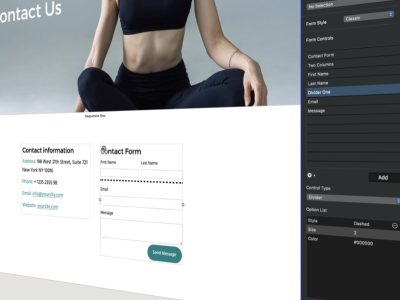Many businesses rely on a high ranking in search engine results pages. Internet users typically want to find the link that is most relevant to their search. Typically, almost 68% of users will click on one of the top five search engine results links. This is why Search Engine Optimization is so important to many businesses. If the link to your site doesn’t rank in the first five search results, the chances of someone scrolling down and clicking on the link to your site are considerably less. Actually under 4% for links ranking sixth through tenth on the search results page.
So if SEO is important then you will want to be using all the tools that are available. In EverWeb, there are a few great and easy ways to get a handle on understanding what SEO is, how it works, and how to make your site optimized to get your site’s pages ranked as high as possible.
EverWeb’s SEO Toolbox!
SEO has always been baked into EverWeb but in a way that makes it easy for novices to take advantage of it without having to have SEO knowledge to do so. For those who need to know about SEO but don’t have SEO knowledge yet, the SEO for EverWeb Video Course is a must. Each chapter in the course is short and to the point and made to be understood at all levels of SEO knowledge. If you’re already SEO savvy, you’ll probably know already how to use the fields in EverWeb’s Inspector to get the best SEO results.
in addition to the SEO for EverWeb Video Course, there is also the EverWeb SEO Power Up addon. This tool, introduced in EverWeb 3.4, give you the ability to fine tune your SEO as we discussed in our blog post EverWeb’s All New SEO Power Up Add On. If SEO is critical to your business then this is the add-on you need to be using!
Finally, SEO and blogging always seem to go hand in hand with each other. So can your blog help improve your website’s SEO and, if so, how?
Blogging and SEO in EverWeb
Well, you might think that a blog would have something extra that would boost your SEO, but the reality is that the same rules that apply to your website’s regular pages will also apply to your blog posts. Having said that, though, there are some things that we can look at which will help your posts give your SEO bit more of a boost!
- Content Is Still King! When it comes to blogging, your content is just as important as it is on any of the regular pages in your site. When scripting your blog post, make sure to have your keywords in the blog post as high up in the post as you can without disturbing the flow of what you are writing. If you’re forcing keywords in to your text just for the sake of SEO then you’re likely to make your content less readable. The golden rule here is to use keywords if it’s possible without unbalancing the content. At the end of the day, your visitors are more likely to come back to your blog if they find well written content. That trumps SEO anytime!
- Don’t Plagiarize… Another content related rule that’s important for bloggers to follow is not to plagiarize someone else’s work or even your own. Web crawling spiders will find plagiarized work and your content and site will be down graded in SEO rankings. In blogging, it’s always good to have ‘evergreen’ ideas that never go out of fashion (e.g. getting started type blog posts) but when you need to tap that content for a blog post, find a new spin on the idea and tackle it from a different angle from what you have previously done. By all means read what you have previously written (or someone else’s blog) but then when it comes to writing your own, with you own spin on it, write it from scratch. Don’t lift content from one blog post and dump it in to a new one. Search engines are smarter than that. Also don’t just change a few words as, again, search engine’s are more savvy than you think and again you’ll get marked down if you do so! And of course, remember that if you plagiarise someone’s work, you could get sued!
- ..But Do Quote! Whilst plagiarising is bad, quoting others and your own work is a good thing and a blog post is a great place to do this. Again, use this wisely so that you don’t overload a post with links to either your own work or to others. Be smart about it. Again, links to your own work and that of others should be relevant to your post and should demonstrate something or illustrate a point you are making. If you have ever done a dissertation, then use this approach to your blogging references. Make them solid when you link to other work. These links and link backs are good to add to your blog post.
- Use EverWeb’s Short Summaries and Keywords. Introduced in EverWeb 3.5, Blog post short summaries and keywords will help your SEO. When you perform a search on the Internet and the results set comes up with a blog post, you will see under the linked title, a description. This description is usually the first couple of sentences of the post itself unless you replace it with a Short Summary. Using a Short Summary is like giving potential visitors an extract of what the post is about. This can be more meaningful than the first few lines of the post itself, and you can always add keywords in to the Short Summary if it’s appropriate to do so.The other tool is to add relevant keywords that can be crawled by search engine spiders. You can add in Short Summaries and Keywords to your posts by clicking on the post you want, then clicking on the Settings cog/button and selecting Edit…
- Create a Good Title for Your Post. Creating a good title for your blog post not only will attract more visitors but will also be noticed by search engine’s too. It’s similar to using the Page Description field on a regular page. Page descriptions and blog post titles will get crawled so make it good!
- Get the ALT Text of it! As we all know, images are important and can convey more easily what would sometimes take too many words to convey. You use. the ALT Text fields in EverWeb to add text that succinctly describes the image. The original intention is that if the image cannot be displayed at least the person looking at the page has an idea as to what should be there. The ALT Text field is also used by those who are visually impaired so it’s doubly good to add in these descriptions. ALT Text fields are generally regarded as having an indirect effect on SEO, and it also adds a touch of professionalism to your site to include this. You can add ALT Text to your cover image in your post in the Widget Settings of the Blog Post Page. If you have an image embedded in the blog post editor window, select the image and then click on the ‘i’ icon and add in the ALT Text that you wish to use. Again, if possible include your keywords, but again this is not obligatory if it not relevant to the image itself. If you add images in to your blog post preview window (where they will be visible on all blog post pages) then you can add ALT Text by selecting the image then going to the Shape Options tab and adding the text in to the ALT Text field in the Fill section.
SEO is Always in a State of Flux
One thing that is always worth noting about SEO is that it is always in flux. Search engines are constantly changing the algorithm or adding new or different methods to use to deliver search engine results pages to end users. This means that keeping up with the latest developments in SEO and implementing SEO in to your website should be something that you always do when building your blog posts and indeed your whole site.










Comments